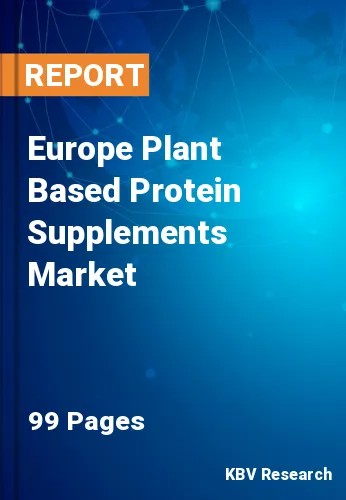The Europe Plant-based Protein Supplements Market would witness market growth of 7.5% CAGR during the forecast period (2021-2027).
Health awareness among the consumers has been boosted by a surge in the occurrences of obesity around the world, increasing number of health issues like heart diseases, and high blood pressure, asthma, diabetes, and others. There has been a dip in per-capita consumption of meat, particularly in well-established countries in the last few years. Moreover, there is a high level of popularity of food products with high nutritional value and quite same texture & taste of meat. Moreover, the growth of the global plant-based protein supplement market would witness bright prospects due to the robust marketing and positioning strategies along with unique product launches.
In addition, the use of soy and pea protein supplements is anticipated to fuel due to the growing concerns about glutamic disorders and lactose intolerance among the young generation in the established market such as Germany. Most of the manufacturers prefer to sell their products via several distribution channels such as e-commerce platforms, supermarkets, and direct selling contracts. The easy availability of these products in various forms like Ready-to-Drink (RTD), powder, liquids, and capsules markets make them highly popular around the world.
In the European region, the consumers’ buying habits are constantly changing for plant-based proteins. In addition to it, consumers around the world are shifting towards other alternative products, like green label food products, along with increasing awareness of healthy and plant-based products, thereby propelling the growth of the regional plant-based protein supplements market. Moreover, the consumers of this region are getting more aware of the rates of allergies that are directly associated with the consumption of animal-based proteins. Due to these, a rising number of consumers prefer meat alternatives that are prepared of vegan protein, which eventually boosts the demand & growth of the market.
As per the reference list of allergen data collection, the population suffering from allergies related to chicken meat varies from 0.5 – 5% in Southern Europe. This constitutes the major portion of the region’s population. This group of people is more willing to consume plant-based protein with an aim to promote their health. Thus, these aspects would fuel the growth of the European plant-based protein market.
The Germany market dominated the Europe Pea Plant Based Protein Supplements Market by Country 2020, thereby, achieving a market value of $82.5 million by 2027. The UK market is exhibiting a CAGR of 5.5% during (2021 - 2027). Additionally, The France market is poised to grow at a CAGR of 7% during (2021 - 2027).
Based on Product, the market is segmented into Protein Powder, Protein Bars, Ready-to-Drink (RTD) and Others. Based on Raw Material, the market is segmented into Soy, Pea, Rice, Hemp, Spirulina, Pumpkin Seeds and Others. Based on Distribution Channel, the market is segmented into Online Stores, Supermarket and DTC & Others. Based on Application, the market is segmented into Sports Nutrition and Additional Nutrition. Based on countries, the market is segmented into Germany, UK, France, Russia, Spain, Italy, and Rest of Europe.
Free Valuable Insights: The Global Plant Based Protein Supplements Market Size will Hit $9.2 Billion by 2027, at a CAGR of 8.4%
The market research report covers the analysis of key stake holders of the market. Key companies profiled in the report include Glanbia PLC, AMCO Proteins, Quest Nutrition LLC (Atkins Nutritionals Holdings, Inc.), NOW Foods, Inc., Danone S.A., MusclePharm Corporation, Abbott Laboratories, PepsiCo, Inc., Alticor Inc. (Amway Corporation), and Kerry Group PLC.
By Product
By Raw Material
By Distribution Channel
By Application
By Country
Our team of dedicated experts can provide you with attractive expansion opportunities for your business.

